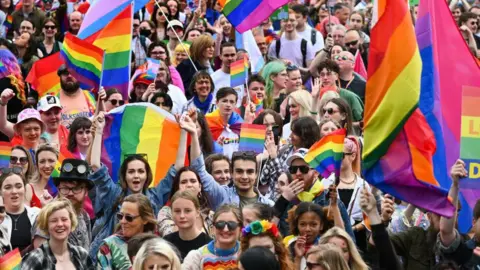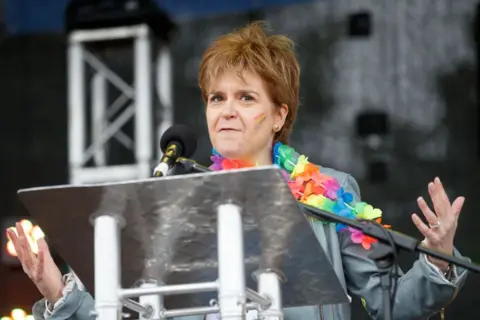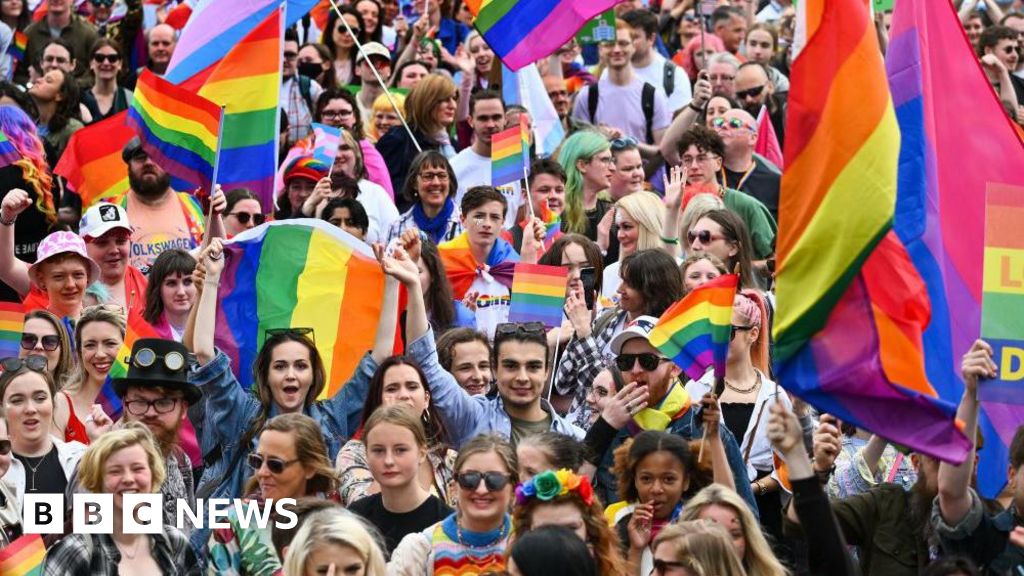 Getty Images
Getty ImagesGlasgow Pride has banned political parties from this year’s festival over a perceived lack of action in response to the recent Supreme Court gender ruling.
Organisers said politicians had failed to speak out or provide clarity after the UK’s highest court said a woman was defined by biological sex under equality law.
Parties will not be allowed to register for a space or host a stall at the annual LGBT+ march on 19 July, with politicians banned from making speeches.
It follows announcements earlier this week by Pride groups in Birmingham, Brighton, London and Manchester in a gesture of solidarity with the transgender community.
The Glasgow parade has attracted as many as 50,000 people in recent years.
Politicians can still attend the event, but will be expected to do so as individuals or as elected representatives of their local community rather than their party.
Glasgow’s organising committee acknowledged that many politicians had been very supportive of the event in the past.
But it said it had been forced to act in response to a “lack of action and delay of comment from parties” in the wake of the Supreme Court ruling.
In a statement posted on social media it said resulting uncertainty had created “mass confusion” over use of essential services, affecting the privacy, dignity and safety of a vulnerable section of its community.
“This has even resulted in cis women being challenged for going into a female toilet because they have a short haircut,” the statement added.
The Supreme Court ruling marked the culmination of a long legal battle, after the Scottish government argued that transgender people with a gender recognition certificate are entitled to the same sex-based protections as biological women.
The judges unanimously agreed with the campaign group For Women Scotland which argued that sex was defined by biology under the 2010 Equality Act.
While the ruling was welcomed by some campaigners representing lesbian, gay and bisexual people who say it protects single-sex groups, others shared concerns about the impact on the trans community.
 Getty Images
Getty ImagesPoliticians including Nicola Sturgeon, Sir Keir Starmer, Boris Johnson and Sir Ed Davey have previously attended Pride marches throughout the UK.
Scottish Greens co-leader Patrick Harvie, a prominent advocate of transgender rights, said he understood the decision by Glasgow Pride.
“As both a politician and someone who has been out since before my first election and has never shied away from standing up to prejudice, I feel ashamed of how politics in this country is letting down my own community,” he said.
“I am of course disappointed at this decision, but the betrayal of our human rights by most political parties is the cause of this horrendous situation, and I fully respect the right of Pride organisers to make this decision.”
Some UK organisations – including in sport and politics – have changed or updated their policies around single-sex teams and spaces such as toilets and changing rooms in response to the Supreme Court ruling.
An interim update from the Equality and Human Rights Commission (EHRC), which enforces equalities law and provides guidance to policymakers, has said access to such spaces must be based on biological sex.

